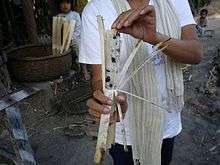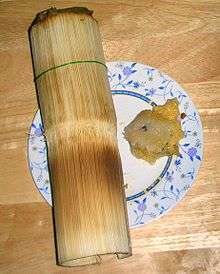Kralan


Kralan (Khmer: ក្រឡាន) or khao lam (Thai: ข้าวหลาม, pronounced [kʰâw lǎːm]; Lao: ເຂົ້າຫລາມ) is a Southeast Asian rice dish made of sticky rice with red beans, sugar, grated coconut and coconut milk roasted in specially-prepared bamboo sections of different diameters and lengths. It can be prepared with white or dark purple (khao niao dam) varieties of glutinous rice. Sometimes described as a "cake", thick khao lam containers may have a filling of coconut custard in the center which is made from coconut cream, egg and sugar.In Thai, “kao” means glutinous rice and “lam” means the cooking process which involves roasting the contents in prepared bamboo sections. Kaolam has many advantages. For example, it can be consumed as food or as a dessert It is a cultural food and is an OTOP[1] product . Moreover, Thai people present Kaolam to monks to make merit. Furthermore, it is gradually becoming a Thai tradition.
In the past, Thailand had an uncountable number of bamboo trees. Thai people thought about the utility of using bamboo for cooking purposes. The ingredients of Kaolam are glutinous rice, black beans, coconut milk, sugar and salt.[2] Moreover, taro or young coconut may be added for a more appetizing taste. To make Kaolam, the first step is to cut a piece of bamboo with one knot intact at one end and the other end exposed. Then, clean the outside surface of the bamboo and dry it. The second step is to clean the rice with water until the water turns clear. Then, dry and mix the rice with the black beans.The third step is to mix coconut milk, sugar and salt. The fourth step is pouring the rice prepared in the second step into about two-thired of the bamboo sections, then pour the coconut mixture on top of the rice. The fifth step is to arrange the sections into rows and put a layer of a trunk of a banana tree to cover the side of the section rows. The final step is to roast it the bamboo sections for about 30 - 45 minutes until the sections turn yellow. Then, serve it.
Nowadays, Kaolam is not only food or to give to the monks but also has become the product that produce so many benefits and careers for Thai people. Kaolam has also because as a traditional knowledge that we can conserve for the next generation.
In Cambodia, kralan cake is often made and eaten at Chinese New Year and Khmer New Year. Thma Krae village in Kratie Province has become well known for making the tastiest kralan.[3]
References
- ↑ ""ข้าวหลามปลาร้า" แซบสไตล์อีสาน สูตรเด็ดแม่แอ๊ด โอทอปนครปฐม". ASTV ผู้จัดการออนไลน์. Retrieved 2015-05-17.
- ↑ "ข้าวหลาม อาหารจากภูมิปัญญาไทย". Sukhothai Thammathirat Open University. Retrieved 2015-05-17.
- ↑ Nhem, Chea Bunly (May 22–23, 2004). "Let Them Eat Cake". The Cambodia Daily. Retrieved 2009-01-11.